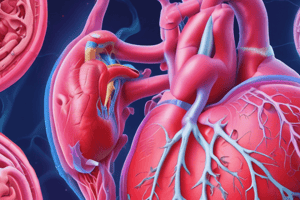Podcast
Questions and Answers
What is one key goal of secondary prevention following a myocardial infarction?
What is one key goal of secondary prevention following a myocardial infarction?
- Increase body weight
- Avoid dietary changes
- Reduce risk of recurrent MI (correct)
- Limit physical activity
Which dietary change is recommended in a heart-healthy diet?
Which dietary change is recommended in a heart-healthy diet?
- Decrease fruit and vegetable intake
- Increase trans fats
- Avoid whole grains
- Increase omega-3 fatty acids (correct)
How much aerobic exercise is recommended per week for secondary prevention after an MI?
How much aerobic exercise is recommended per week for secondary prevention after an MI?
- 300 minutes
- 75 minutes
- 50 minutes
- 150 minutes (correct)
Which medication is used to lower cholesterol levels in secondary prevention?
Which medication is used to lower cholesterol levels in secondary prevention?
What is a recommended strategy for managing comorbidities following an MI?
What is a recommended strategy for managing comorbidities following an MI?
Study Notes
Secondary Prevention Following an MI
Goals of Secondary Prevention
- Reduce risk of recurrent myocardial infarction (MI) and cardiovascular events.
- Improve long-term health outcomes and quality of life.
Key Strategies
-
Lifestyle Modifications
- Dietary Changes
- Adopt a heart-healthy diet (e.g., Mediterranean, DASH).
- Reduce saturated fats, trans fats, sodium, and added sugars.
- Increase fruits, vegetables, whole grains, and omega-3 fatty acids.
- Physical Activity
- Engage in regular aerobic exercise (e.g., walking, cycling) for 150 minutes/week.
- Include strength training at least twice a week.
- Weight Management
- Aim for a healthy BMI; weight loss if overweight or obese.
- Smoking Cessation
- Total cessation of tobacco use; provide resources and support.
- Dietary Changes
-
Medications
- Antiplatelet Agents
- Aspirin and/or P2Y12 inhibitors (e.g., clopidogrel) to prevent clot formation.
- Beta-Blockers
- Helps reduce heart workload and risk of arrhythmias.
- ACE Inhibitors/ARBs
- Indicated for patients with heart failure, hypertension, or diabetes.
- Statins
- To lower cholesterol levels and stabilize atherosclerotic plaques.
- Antiplatelet Agents
-
Managing Comorbidities
- Hypertension
- Target blood pressure <140/90 mmHg.
- Diabetes Management
- Maintain HbA1c levels <7%.
- Hyperlipidemia
- Target LDL cholesterol levels <70 mg/dL in high-risk patients.
- Hypertension
-
Cardiac Rehabilitation
- Structured program including supervised exercise training, education, and psychological support.
- Increases adherence to lifestyle changes and reduces risk of future cardiac events.
-
Regular Follow-Up and Monitoring
- Schedule periodic medical evaluations to assess cardiovascular risk factors.
- Monitor medication adherence and side effects.
Patient Education
- Empower patients with knowledge about their condition and the importance of secondary prevention.
- Educate on recognizing symptoms of recurrent MI or complications.
Psychological Support
- Assess for depression or anxiety, which can impact recovery and adherence.
- Provide referrals for counseling or support groups as needed.
Importance of a Multidisciplinary Approach
- Involve healthcare team members (physicians, nurses, dietitians, psychologists, and exercise physiologists) for comprehensive patient care.
Secondary Prevention Following an MI
- Secondary prevention aims to reduce the risk of another MI and cardiovascular events.
- It aims to improve long-term health outcomes and quality of life.
Lifestyle Modifications
- A heart-healthy diet, such as Mediterranean or DASH, is recommended.
- Dietary changes include reducing saturated fats, trans fats, sodium, and added sugars.
- Increasing fruits, vegetables, whole grains, and omega-3 fatty acids are important.
- Regular aerobic exercise (e.g., walking, cycling) for 150 minutes per week is recommended.
- Strength training at least twice a week should be included.
- Aim for a healthy BMI and weight loss is recommended if overweight or obese.
- Complete cessation of tobacco use is essential with resources and support provided.
### Medications
- Antiplatelet agents, such as aspirin and P2Y12 inhibitors (e.g., clopidogrel), help prevent clot formation.
- Beta-blockers help to reduce heart workload and reduce the risk of arrhythmias.
- ACE inhibitors and ARBs are indicated for patients with heart failure, hypertension, or diabetes.
- Statins lower cholesterol levels and stabilize atherosclerotic plaques.
Managing Comorbidities
- Hypertension needs strict blood pressure control.
Studying That Suits You
Use AI to generate personalized quizzes and flashcards to suit your learning preferences.
Description
This quiz focuses on strategies for secondary prevention after a myocardial infarction (MI). Learn about lifestyle modifications, medication regimens, and their impact on long-term health outcomes. Understanding these concepts can improve your clinical practice and patient care.




